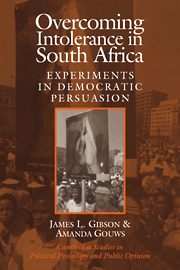Book contents
- Frontmatter
- Contents
- List of Tables and Figures
- Preface
- Part I Introduction
- 1 Political Tolerance in the New South Africa
- 2 The South African Context
- Part II South African Intolerance as It Is
- Part III South African Tolerance as It Might Be
- Appendix A Research Design and Methodology
- References
- Index
- Books in the series
1 - Political Tolerance in the New South Africa
Published online by Cambridge University Press: 22 October 2009
- Frontmatter
- Contents
- List of Tables and Figures
- Preface
- Part I Introduction
- 1 Political Tolerance in the New South Africa
- 2 The South African Context
- Part II South African Intolerance as It Is
- Part III South African Tolerance as It Might Be
- Appendix A Research Design and Methodology
- References
- Index
- Books in the series
Summary
In April 1994, South Africans of every race streamed to the polls to register their choices in the first all-race election ever conducted in the country. The voting in SouthAfrica's first democratic election was the culmination of a long and brutal struggle by the majority of South Africans to share in their own governance. The opening of the political process to all the citizens of the country marked the end of authoritarian rule in South Africa by the white minority.
The implementation of institutions of majority rule should not be understood as the culmination of the country's transition to democracy. Instead, the election marked the beginning of a process of democratization. Democracy requires far more than political institutions through which the majority can express its preferences. At a minimum, democracy also requires institutionalized protections for the opportunity of political minorities to compete for political power, to attempt to become political majorities. Moreover, successful democracy most likely requires a host of supportive nongovernmental institutions, often referred to as a “civil society.” Without strong institutions capable of checking the power of the state, democracies often slip back into authoritarianism (or “illiberal democracy”); without strong institutions to recruit and nurture citizen participation and to develop a sense of competence at self-government, citizens in democracy often abdicate their crucial roles. Parliaments and presidents are important for democracy, but so too are strong courts, businesses, interest groups, and perhaps even a middle class.
- Type
- Chapter
- Information
- Overcoming Intolerance in South AfricaExperiments in Democratic Persuasion, pp. 3 - 14Publisher: Cambridge University PressPrint publication year: 2002



